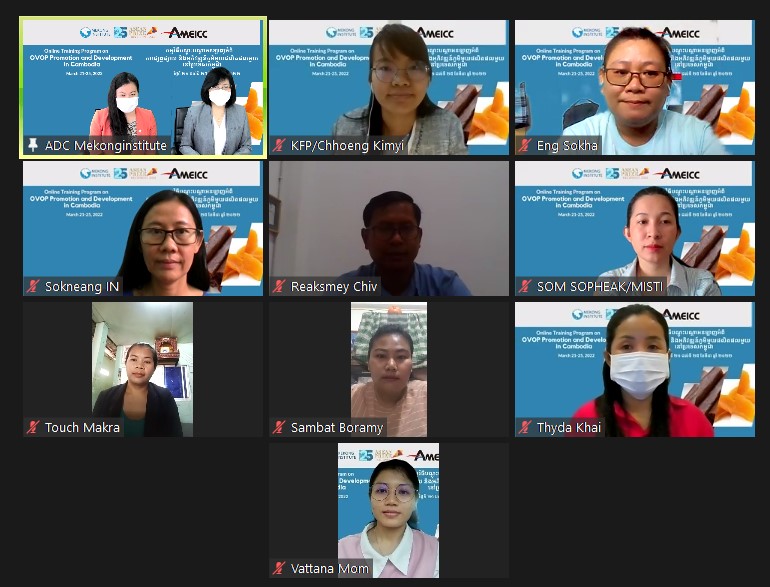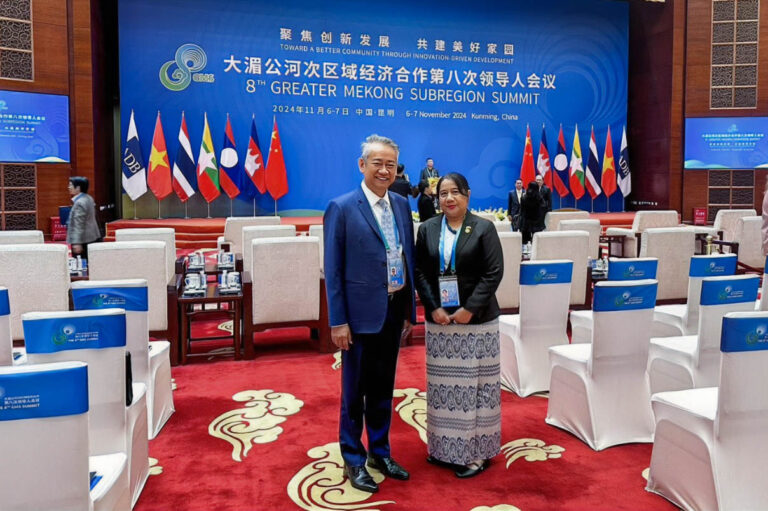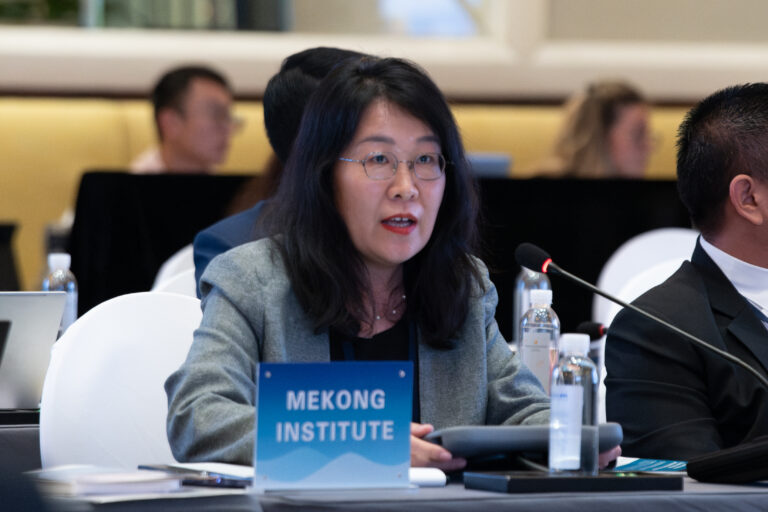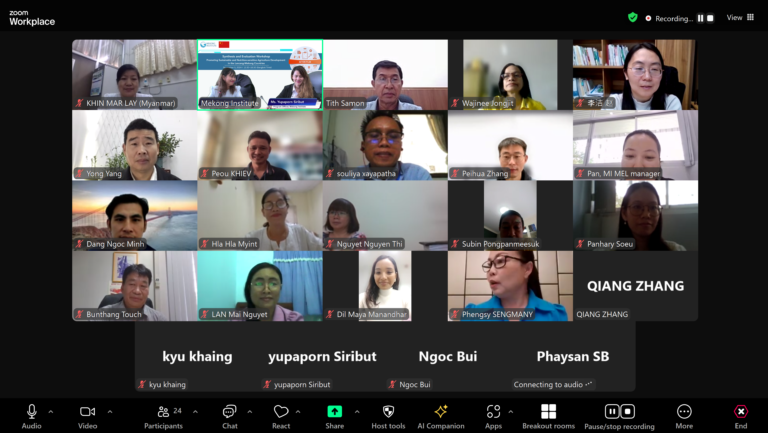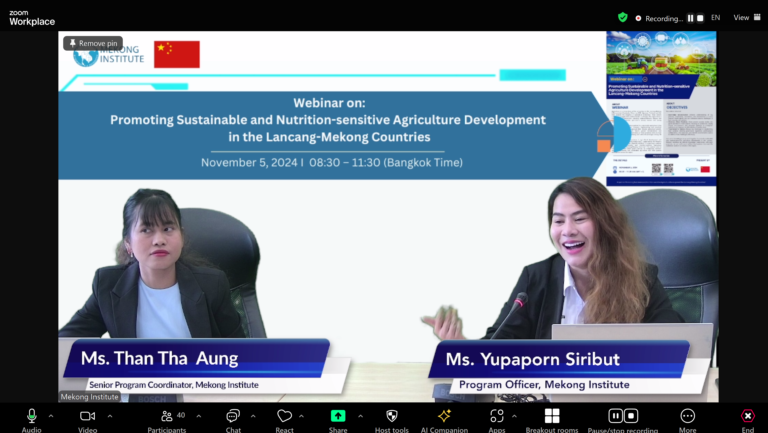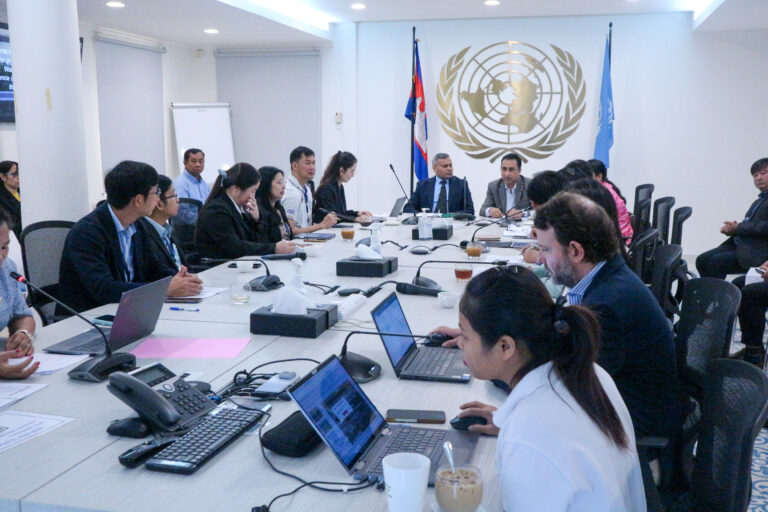To support the promotion and development ‘One Village One Product’ (OVOP) in Cambodia, the Mekong Institute (MI) organized a 5-day online training program for relevant national government officials and small and medium enterprises (SMEs) in the country on March 21-25, 2022.
With financial support from the AEM-METI Economic and Industrial Cooperation Committee (AMEICC) Secretariat, this training is part of the eight-month capacity building program on ‘The Technical Assistance for Community Development in Mekong Subregion’, which aims to enhance the capability and potential of SMEs and community enterprises in Cambodia, Lao PDR, and Vietnam (CLV) to create value-added of agricultural produce and strengthen the economy of the region.
Being implemented in CLV countries, the training series was initiated based on the success of adoption and implementation of the ‘One Village One Product’ (OVOP) initiative in Japan. Thailand has adopted this OVOP concept, which turned into One Tambon One Product (OTOP), and has been successful in promoting OTOP throughout the country. Through this training, MI aims to transfer knowledge and technical assistance from Thailand to CLV countries to hopefully replicate the benefits from Thailand’s success.
In her welcome remarks, Ms. Maria Theresa S. Medialdia, Director of Agricultural Development and Commercialization (ADC) Department of MI, highlighted the key objective of the training program, which is “to improve the SMEs’ capacity to be able to produce more demand driven higher value-added products rather than simply selling the raw agricultural produce in the market.” Through this capacity building program, she later added, “the SMEs of Cambodia will be able to improve their existing knowledge and technical know-how in the areas of agri-food processing and applying appropriate technologies application including product quality preservation, processed product’s shelf-life prolonging etc., to be shared by various key guest speakers and expert trainers.”
In addition, with the participation from the public sector, Ms. Medialdia was optimistic that the inclusion of government officials in the training will help ensure the continuous support from the public sector on this important and meaningful initiative.
These inter-ministerial participants are expected to further widely disseminate the knowledge acquired from the program and closely support SMEs in complying with OVOP standard and requirement and also in gaining access to wider potential markets,
she added.
This training program is designed to specifically focus on the processed mango products in Cambodia based on the results of the Training Needs Assessment conducted by MI OVOP Team prior to the training program. The export of Cambodian fresh mangoes to international markets went up to 163,828 tons (251%) during the first eight months of 2021 and more than 100,000 hectares of land in the country are employed to grow mangoes, especially in Kampong Speu, Kampot, Battambang, and Banteay Meanchey provinces (MAFF, 2021). It is also projected that approximately 1.5 million tons of mango can be harvested annually. This data shows that mango has a potential to be processed for export. At present, the number of mango processers is still limited in Cambodia, producing jam, juice, and dried mango, among others. However, various stakeholder representatives identified the challenges being faced by SMEs, including product branding, marketing, selection, and food safety, and quality standard requirements, to a name a few.
During the 5-day training program, the participating SMEs representatives and government officials discussed various topics, including OVOP concept, entrepreneurship skills, concept of demand-driven, food processing and packaging technologies, food safety, market access, and product branding and digital marketing, among others.
The training also provided an opportunity for participants to interact with Thai and Khmer experts to address considerable challenges facing OVOP promotion and development in Cambodia and the region. The Thai experts invited come from the Department of Community of the Ministry of Industry, and Waraportn Fruit and Food Processing Co., Ltd while the local experts of Cambodia are from the National Committee of OVOP Movement of the Council of Agriculture and Rural Development, Council of Minister, and SMEs Department of Ministry of Industry, Science, Technology and Innovation (MISTI).


